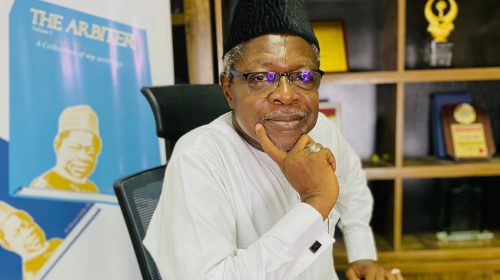Playing up Risk Management as Nigeria Hits Tough Times
Nigeria, unlike its East Africa counterpart has come under serious economic recession. The poor state of the Nation’s economy dominates virtually every discussion at every stratum. The poor are crying as well as the rich, particularly, when virtually the price of all commodities, both locally manufactured and imported rise astronomically. To worsen the situation, the free fall of Naira against Dollar and increase in price of petroleum products are not helping matters.
Unfortunately, it was just of recent that the Federal Government publicly admitted that Nigeria is in recession, although, with assurance that President Mohammed Buhari’s led government is working assiduously to fix the dilapidated economy. It is a statement of fact that every Country experiences tough times, downturn one time or the other, Nigeria isn’t the first, it won’t be the last, however, the essential of the recession is the lesson the nation and its people need to learn from the process.
Within the recession, aside the high rate of foreign exchange, the fastest growing threat to human and the society is the rate of job cut especially in the banking industry and other financial services providers. Until recently, through the intervention of the Federal Government, it suddenly became a trend in the banking sector to reduce the employees in thousands. Sectors, where downsizing or rightsizing are not evitable, roll over months with barrage of salary backlog to their employees. This has increased the crime rate in Nigerian society.
It was not funny, when a robbery gang visited a community in Ikorodu axis of Lagos State recently with their P.O.S Machine to confirm the viability of every credit card collected. Such occurrence was not new to an average Lagosian, but it arouse curiosity when the fully armed wild looking young men, were appealing with all sincerity, to their victims not to be offended by their act, alluding it to the poor economic situation of the country.
Experts are of the opinion that such act is a dangerous pointer to a bleak future of a nation that pride itself as the giant of its continent. It is becoming a trend that needs to be nipped at the bud, without which the nation sits on a keg of gun powder, which only requires time to explode. The trend is also a warning to all that occupy the seat of power in the Country. The outburst of kidnappers is outrageous, leaving no zone unaffected. It is no more news that kidnappers have gone to the extent of desecrating the highly revered throne of the Kings, kidnapping Kings for ransom, while Pastors and other religious clerics are not left saved, all in the name of making ends meet.
Although, risk abounds everywhere and may happen at any time. It has no respect for economic boom nor downturn, but worst when risks are not adequately insured at the right time, when there is no mechanism on ground to mitigate the effect at a time when the purchasing ability is next to zero. The cost of replacing goods lost to any disaster can be enormous, aside the psychological effect it may impact on its victims.
To a layman, Government is not doing enough to bring back a good time as the nation faces ups and downs in its economic projection most especially, when the present situation is being compared with the pre election campaign promises of a Nigeria paradise. Experts believe that the current recession is self induced. According to them, the President Buhari’s led government is being careful in tackling the issue of corruption that became a deadly cankerworm to Nigeria economy at the tail end of the last regime. The Nigerian government is addressing corruption but it is difficult in an economy that could suffer deflation. There is no new money coming in, it is just being recycled. The nation’s greatest risk however is its inability to change. Experts expressed that the fall in Oil prices at the international market should have been projected when the rest of the world is talking about green energy. There are basic indices to prove to every forward looking government that Nigeria is heading towards recession ever before now. Before the exit of the last regime, Nigeria government at a time was running the country on accumulated debt, using debt to service debt, while on the surface; citizens were assured of the Nation’s liquidity.
Nigeria is so fixated on Oil and Gas products that it could hardly diversify its mono economy. Nigeria, aside being the giant of Africa, is blessed with diver natural resources, which most developed countries of the world lack. The likes of Singapore, Malta, even the United Kingdom were not as blessed with the natural recourses at Nigeria disposal; still, their economy is far better than that of Nigeria. What a great nation is Nigeria, rich in natural resources, but astronomically poor in its management.
As it has been stated earlier, at a time like this, risks are inevitable. Suffice it to say that every uninsured risk further depletes the poorly managed meager wealth of the nation. For instance, the crime rate is already on the increase. Without really being a prophet of doom, many more valuables are likely to be snatched as many more groups of bandits are likely to spring forth. Many young Nigerians who have lost their jobs in this process may likely risk their lives into kidnapping business, defrauding enterprise and internet base fraud. Drivers poorly motivated may end up thinking otherwise. Except for quick intervention, many more jobs cut are in pipeline. The list is inexhaustible.
All these are potential risk in today’s Nigerian society. Business managers and owners are warned to be wary of risks that are capable of consuming their investment by increasing their focus on risk management. It is risky not to be risk cautious. There are numbers of companies in Nigeria today that could have gone into oblivion but for the instrumentality of insurance. The likes of Nigerian Bottling Company which was gutted by fire some years back is a typical example to reckon with. It is more essential now that the purchasing ability of naira has depreciated than when the economy is good. It is the lie of old time believe that insurance don’t pay claims. This has resulted in huge distrust in insurance and the possibility that companies choose not to insure at all, preferring to carry their own risks than to trust their money to the insurance market.
Meanwhile, industry watchers have opined that on the side of Insurance Operators, there is need for massive awareness at a time like this. The Minister for Finance, Mrs. Kemi Adeosun once noted that the bane of the industry is lack of awareness, urging the operators to collaborate and dole out massive advertisement plan.
BY
Dele Ayeleso, the Public Relation and Communication Manager, Nigerian Council of Registered Insurance Brokers (NCRIB)







Leave a Reply